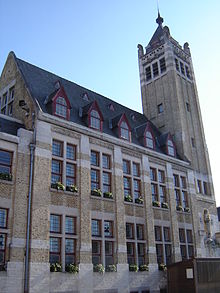Roeselare
| Roeselare | ||
|---|---|---|

|

|
|
|
|
||
| State : |
|
|
| Region : | Flanders | |
| Province : | West Flanders | |
| District : | Roeselare | |
| Coordinates : | 50 ° 57 ' N , 3 ° 7' E | |
| Area : | 59.79 km² | |
| Residents: | 62,954 (Jan 1, 2019) | |
| Population density: | 1,053 inhabitants per km² | |
| Post Code: | 8800 | |
| Prefix: | 051 | |
| Mayor: | Kris Declercq ( CD&V ) | |
Local government address : |
Botermarkt 2 8800 Roeselare |
|
| Website: | www.roeselare.be | |
Roeselare [ ˈɾusəla: rə ] (French Roulers ) is a town in the center of the Belgian province of West Flanders . It has 62,954 inhabitants (as of January 1, 2019). The communities Beveren, Oekene and Rumbeke also belong.
history
The first written mention of Roeselare comes from the year 882 . In the 10th century , Roeselare was an important trading center in the region . In 1250 the settlement received city rights. In 1488 the city was completely devastated by Maximilian I of Habsburg. After fighting with France , the peace treaty of Nijmegen was concluded in 1676 , with some parts of Flanders coming under French rule, including Roeselare. During the years under French rule, the city developed into a notorious smuggling center, as the city was right on the border. Here, on July 13, 1794, the French under Pichegru and MacDonald won over the Austrians under Clerfait . After the defeat of Napoleon I in the Battle of Waterloo and the Congress of Vienna in 1815, the city belonged to the United Kingdom of the Netherlands ( see History of Belgium ).
Due to the dominance of the French language over the Flemish dialects , a student uprising broke out on July 28, 1875. The leader of the uprising against the use of French in the classroom was the author and poet Albrecht Rodenbach, well known in the region .
During the First World War , the city was used by the German troops as a garrison for the Ypres arch .
Name declaration
Roeselare had different spelling variations over time. Until the end of the 11th century the city was called Rosellaere , then for a short time Russelaere and in the meantime also, very similar to today's spelling, Roesellaere . When the borders were shifted in the 17th century, it became the French Roussellaere . The city of Roeselare has only been written since 1937 .
According to current research, the origin of the name lies in the Gothic word out , which has the meaning of reed , and the Germanic word hlearis , which means something like forest clearing .
Partnerships
Roeselare has had an unofficial partnership with the German village of Trulben since 1965 .
Culture
Roeselare is home to the Koers , a museum that opened in 1998 in a listed fire station and is dedicated to the history of Belgian cycling.
Sports
In 1911, two football clubs were founded in Roeselare: the Roeselare Sports Association and the Roeselare Football Club . In 2005 KSV Roeselare played for the first time in the First Division in Belgium. The stadium was therefore expanded to 12,000 seats.
The volleyball club Knack Roeselare is a top Belgian club and also plays successfully internationally.
In the district of Rumbeke there is a cycling track that was laid out by the cyclist Odiel Defraeye , the first Belgian Tour France winner in 1912. In 1925 the railway, which initially only consisted of earth walls, was given a concrete runway. In the 1960s, Albert Sercu , Patrick Sercu's father , initiated a restoration of the now ailing track with the help of his son's fans. In 2011, a building contractor bought the property with the now dilapidated railway, had it renovated and named it Wielerpiste Defraeye-Sercu .
Personalities
- Adrian Willaert (≈1490–1562), composer
- Albrecht Rodenbach (1856–1880), writer
- Marie-Louise Demeester (1857–1928), missionary and founder of the order
- Jules Degeetere (1876–1957), racing cyclist
- Gilbert Desmet (* 1931), racing cyclist
- Antoon De Roo (1936–1971), ornithologist
- Roger Vangheluwe (* 1936), Roman Catholic Bishop (1984-2010)
- Patrick Sercu (1944–2019), cyclist
- Jean-Pierre Monseré (1948–1971), racing cyclist
- Koen De Cauter (* 1950), jazz musician and chanson singer
- Geert Bourgeois (* 1951), lawyer and politician
- Paul Bulcke (* 1954), CEO of the Nestlé food company
- Werner Devos (* 1957), racing cyclist
- Marc Degryse (* 1965), football player
- Axel Everaert (* 1965), opera singer and university lecturer
- Carll Cneut (* 1969), writer and illustrator
- Yves Vanderhaeghe (* 1970), football player
- Louis Ide (* 1973), politician
- Grace Verbeke (* 1984), racing cyclist
- Ann-Sophie Duyck (* 1987), racing cyclist
- Jens Debusschere (* 1989), racing cyclist
- Koen Naert (* 1989), long-distance runner, a. a. European champion
- Jelle Wallays (* 1989), racing cyclist
- Guillaume Van Keirsbulck (* 1991), racing cyclist
- Daan Myngheer (1993-2016), racing cyclist
Web links
Individual evidence
- ↑ divorced - Defraeye-Sercu. In: defraeye-sercu.be. Retrieved January 24, 2019 (Dutch).


